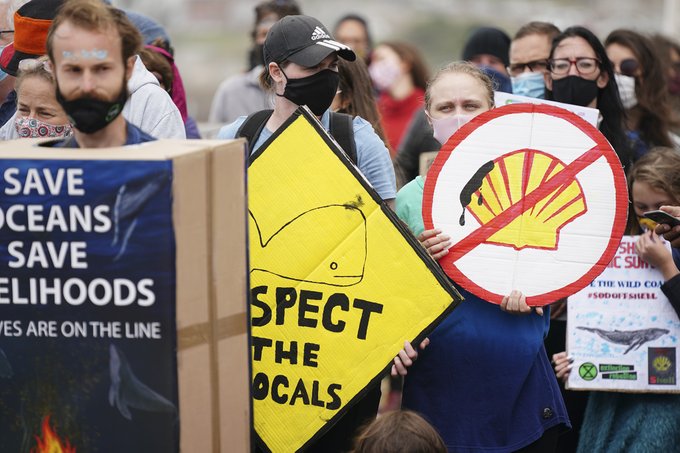“We must do everything we can to undo the destructive colonial legacy of extractivism, until we live in a world where people and the planet come before the profits of toxic fossil fuel companies.”
By Brett Wilkins. Published 12-6-2021 by Common Dreams

Photo: Greenpeace Africa/Twitter
South African activists on Monday vowed to keep fighting after a court ruling allowing fossil fuel giant Shell to proceed with massive underwater explosions off the ecologically sensitive Wild Coast, a move environmentalists say would cause “irreparable harm” to marine life.
“We won’t stop fighting,” tweeted Greenpeace Africa following Sunday’s nationwide protests. “Shell must immediately stop oil and gas exploration off S.A.’s Wild Coast.”
Demonstrators from more than 30 organizations—including 350.org, Clean Seas, Extinction Rebellion, The Green Connection, Greenpeace Africa, Oceans Not Oil, and Sea The Bigger Picture—turned out for over 70 protests nationwide, according to The Cape Argus.
At Surfers Corner at Muizenberg Beach in Cape Town, activists carried a giant marionette of a snoek, a snake mackerel found in area waters, and held placards with slogans including “Stop killing our coast” and “To hell with Shell.”
Demonstrators gathered on a beach near Port Edward, South Africa, to protest against Shell’s plans to conduct a seismic oil exploration along the Wild Coast that they say will cause ‘irreparable harm’ to the marine environment https://t.co/QoxgAOXYDH pic.twitter.com/9aJxXDSbpq
— Reuters (@Reuters) December 6, 2021
“The purpose of this protest is to send a message to Shell bosses and shareholders to stop the company from carrying out the seismic survey on the Wild Coast,” the South Durban Community Environmental Alliance (SDCEA) said in a statement.
“Offshore oil and gas drilling… has the potential to destroy our beautiful ocean heritage as well as negatively affect… the livelihoods of millions of people who depend on the ocean for a living, like the fisherfolk, tourism and recreational industry,” the alliance added.
On Friday, Makanda High Court Acting Judge Avinash Govindjee rejected a bid by four plaintiffs including local fishers and Greenpeace Africa to stop planned seismic blasting along the coast, ruling that their claims of “irreparable harm” to wildlife—especially migrating humpback whales—were “speculative at best.”
Anti-Shell, Anti-fossil, Anti-seismic blasting! Pro-ocean, Pro-renewables, Pro-future!
The protest grows across South Africa and beyond.Join us now wherever you are. #ToHellWithShell #nomorefossilfuels #beachprotest #boycottShell pic.twitter.com/Sl3VILS4mD
— Extinction Rebellion Cape Town (@CtxRebellion) December 5, 2021
In seismic surveys, barrages of powerful sonic pulses are blasted into the ocean floor with airguns; the reflected sound waves are then analyzed to map the seabed for potential oil and gas reserves. The blasts reach more than 250 decibels and kill, injure, and terrorize marine life.
Reinford Sinegugu Zukulu, director of the advocacy group Sustaining the Wild Coast, told the court that the blasting would occur every 10 seconds for five months, would be “louder than a jet plane taking off,” and would be heard underwater for more than 60 miles.
Scenes from today’s march against @Shell. pic.twitter.com/2OUCxVmk3k
— Zolile Shude (@shude_zolile) December 5, 2021
Elaine Mills, a representative of Greenpeace volunteers in Cape Town, told The Cape Argus that the potential destruction “is beyond belief. Really, it’s unimaginable.”
“The harm that [the blasting] can do to marine life is permanent hearing loss, organ rupture as dolphins and whales breach too fast to escape the auditory onslaught, and beach strandings,” she added.
Shell claimed in a statement that it had “long experience in collecting offshore seismic data” and that “the welfare of wildlife is a major factor in the stringent controls we use.”
Mills accused Shell of failing to adequately consult the public about the planned blasting.
“They did not consult the fishing and coastal communities who stand to suffer huge economic losses as a result of Shell destroying the marine heritage,” she said.
While we wait for the hearing of the next court application to stop @Shell from doing seismic testing ahead of exploration for fossil fuels on South Africa’s Wild Coast, let’s look at some of the reasons why it is important to #StopShell. A thread. pic.twitter.com/gVY87MkZLS
— Melissa Fourie (@melissafourie) December 5, 2021
Last week, Shell announced that it would halt plans to drill for oil in the Cambo field off the coast of Scotland’s Shetland Islands following a grassroots campaign against the project. Activists are seeking a similar outcome in South Africa, and a new urgent application to stop the seismic blasting has been filed by environmental groups, local Indigenous leaders and fishers in Port St. Johns.
“We will continue to support the nationwide resistance against Shell and pursue the legal avenue to stop Shell,” said Greenpeace Africa senior campaigner Happy Khambule. “We must do everything we can to undo the destructive colonial legacy of extractivism, until we live in a world where people and the planet come before the profits of toxic fossil fuel companies.”
Zukulu of Sustaining the Wild Coast said the region “is a place of stunning natural beauty. Indigenous people have maintained continued possession of this land, despite waves of colonial and apartheid aggression.”
“Our ancestors’ blood was spilled protecting our land and sea,” he added, “and we now feel a sense of duty to protect it for future generations.”

